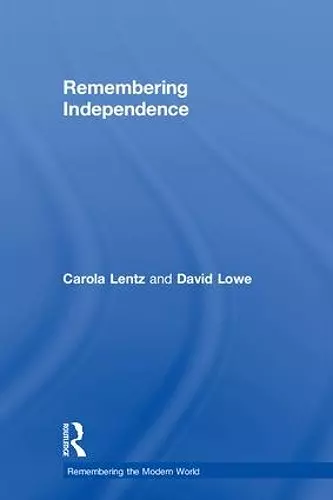Remembering Independence
Exploring the Commemoration of Independence Across Cultures
David Lowe author Carola Lentz author
Format:Hardback
Publisher:Taylor & Francis Ltd
Published:24th Apr '18
Currently unavailable, and unfortunately no date known when it will be back
This hardback is available in another edition too:
- Paperback£39.99(9781138905733)

This book examines the commemoration of independence after decolonisation, focusing on historical and contemporary perspectives across various regions. Remembering Independence offers valuable insights into this dynamic process.
The book Remembering Independence delves into the complex process of commemorating independence in the wake of decolonisation following World War II. Through insightful case studies from Africa, Asia, and references to the Pacific, the authors highlight how the act of remembering independence is a dynamic and evolving phenomenon. They illustrate that this remembrance has served as a powerful focal point for nations transitioning from colonial rule to independence, encompassing both historical events and contemporary practices.
In Remembering Independence, the authors explore various dimensions of independence, which is portrayed not just as a historical moment but also as an ongoing project. This concept embodies the aspirations for social justice and freedom, while also acknowledging the disappointments and challenges that have arisen in the post-colonial landscape. The narrative emphasizes how independence can be reinterpreted to meet contemporary political visions and societal needs.
This richly illustrated volume draws attention to the diverse media used in commemorating independence, from museums and monuments to oral traditions and national celebrations. By combining historical and anthropological perspectives, Remembering Independence serves as an essential resource for students and scholars interested in the history of empire, decolonisation, and the politics of memory in post-colonial contexts.
"Lavishly illustrated and genuinely inter-disciplinary, Remembering Independence reminds us that, for all the artificiality and incompleteness of so-called 'transfers of power', the cultural symbolism of independence days would resonate in post-colonial societies for years afterwards. Interrogating the multiple roles assigned to ceremonial independence days in political cultures, nation-building narratives, and popular memories, the book offers a refreshingly different perspective on the cultural legacies of decolonization."
Martin Thomas, University of Exeter, United Kingdom
"This excellent study on the complexities of remembering independence contributes to larger questions about populism and nationalism, which is currently rising globally to an alarming extent. On the aesthetic level, the book invites the reader to think about globally-operating companies, who not only sell their service in creating monuments or museums, but also sell a kind of normative symbolism ... the book is a highly recommended reading to all those interested in methodological questions of how to do a meaningful comparison."
Katrin Bromber, TRAFO - Blog for Transregional Research, 18.10.2018, https://trafo.hypotheses.org/13824.
"While offering a broad panorama of different practices of remembering in a range of countries, Lentz and Lowe succeed in presenting their examples in an accessible style that allows non-specialists to engage with the topic. They show that independence is not a fixed event of the past but continuously created and reinterpreted through the perception of participants and later born generations, victims and onlookers."
Christoph Marx, Dhau / Jahrbuch für außereuropäische Geschichte 4, 2019
"The strength of this book lies in the balance between description and comparison. The distinguishing characteristics of the eight selected countries (or by extension of postcolonial Africa and Asia-Pacific in general), the similarities and differences between the eight cases at hand, as well as the differences and changes over time within each of these countries provide complexity to the ethnographical and historical analysis of past, present and future in the remembering of independence ... The book meets the ambitions and expectations it raised. It is also a pleasant read, richly illustrated and replete with insightful examples."
Geert Castryck, Universität Leipzig in Connections. A Journal for Historians and Area Specialists
"[T]his volume is a must-read for anyone interested in postcolonial nationalism, decolonisation of European empires and the memory politics of postcolonial nations between the end of the Second World War and the end of the Cold War."
Stefan Berger, Postcolonial Studies
ISBN: 9781138905726
Dimensions: unknown
Weight: 517g
244 pages